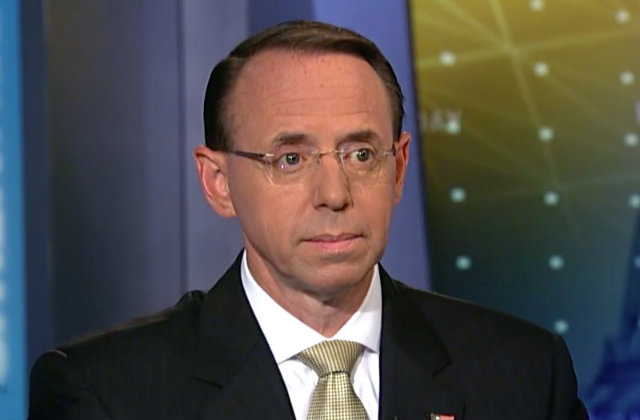 Deputy Attorney General Rod Rosentein is overseeing Special Counsel Robert Mueller‘s Russia investigation after Jeff Sessions recused himself. However, there are some concerns about his ability to adequately supervise an investigation that he has now become a part of. On Tuesday night, The Wall Street Journal broke the story that over the summer, Mueller’s investigators interviewed Rosentein about President Donald Trump‘s firing of former FBI Director James Comey.
Deputy Attorney General Rod Rosentein is overseeing Special Counsel Robert Mueller‘s Russia investigation after Jeff Sessions recused himself. However, there are some concerns about his ability to adequately supervise an investigation that he has now become a part of. On Tuesday night, The Wall Street Journal broke the story that over the summer, Mueller’s investigators interviewed Rosentein about President Donald Trump‘s firing of former FBI Director James Comey.
The Journal claims the FBI’s handling of the interview “could be a sign that Mr. Mueller’s team doesn’t view Mr. Rosenstein as a central witness in its probe, as the deputy attorney general hasn’t withdrawn himself from overseeing it since that interview.” That could very well be the case, but the optics don’t look good. A spokesperson for Rosenstein said “if there comes a time when he needs to recuse, he will. However, nothing has changed.” Well, now might be the time.
“If he is just a witness, it is unusual but acceptable. If he is a person of interest or exposed legally, it is not tolerable,” NYU legal ethics experts Stephen Gillers said during an interview with LawNewz.
Rosenstein, as a federal lawyer and a DOJ employee, is guided by both local D.C. ethics rules and Justice Department guidelines. Both would prohibit him from overseeing an investigation if he is a person of interest or a target.
Specifically Rule 1.7 provides:
(b) a lawyer shall not represent a client with respect to a matter if…
The lawyer’s professional judgment on behalf of the client will be or reasonably may be adversely affected by the lawyer’s responsibilities to or interests in a third party or the lawyer’s own financial, business, property, or personal interests.
However, legal experts emphasize that we don’t know yet whether Rosenstein is a target of the investigation for his role in writing that infamous memo giving Trump “justification” for firing Comey. Did Rosenstein cooperate in a lie to the public? 18 USC 1512(c)(2) says that obstruction happens when a person “corruptly… impedes [an] official proceeding or attempts to do so.”
“Creating a false narrative for firing Comey could be such an attempt. The definition of ‘official proceeding; includes “a proceeding before a Federal Government agency which is authorized by law.’ That language is broad enough to encompass the FBI and the Comey investigation,” Gillers said.
Now, the hope is that if the investigation starts honing in on Rosenstein, Mueller would advise him that he needed to recuse himself. BUT there is this added wrinkle: Mueller may have an incentive in wanting to keep Rosentein as his supervisor. Trump’s team has hinted more than once that he might fire Mueller. Federal law says that technically Trump can’t do the firing. Instead, the U.S. Attorney General (or in this case Rosenstein since Sessions recused himself) would have to do it. From all indications, Rosenstein would probably not demure to such a demand from Trump.
“It would certainly be wrong for Mueller ever to say I am going to take Rosenstein out of the group of people to suspect (in the Russia probe) because of this,” Gillers said.
In the end, we must rely on Mueller’s integrity, and pray that if Rosenstein was in legal jeopardy, Mueller would do the right thing and ask him to take himself off the investigation. In the wake of James Comey’s breach in DOJ policy, asking us to trust our public officials seems like a scary thought. With so much at stake, so many unknowns, and the world watching, Mr. Rosenstein needs to think long and hard about recusing himself.
This is an opinion piece. The views expressed in this article are those of just the author.